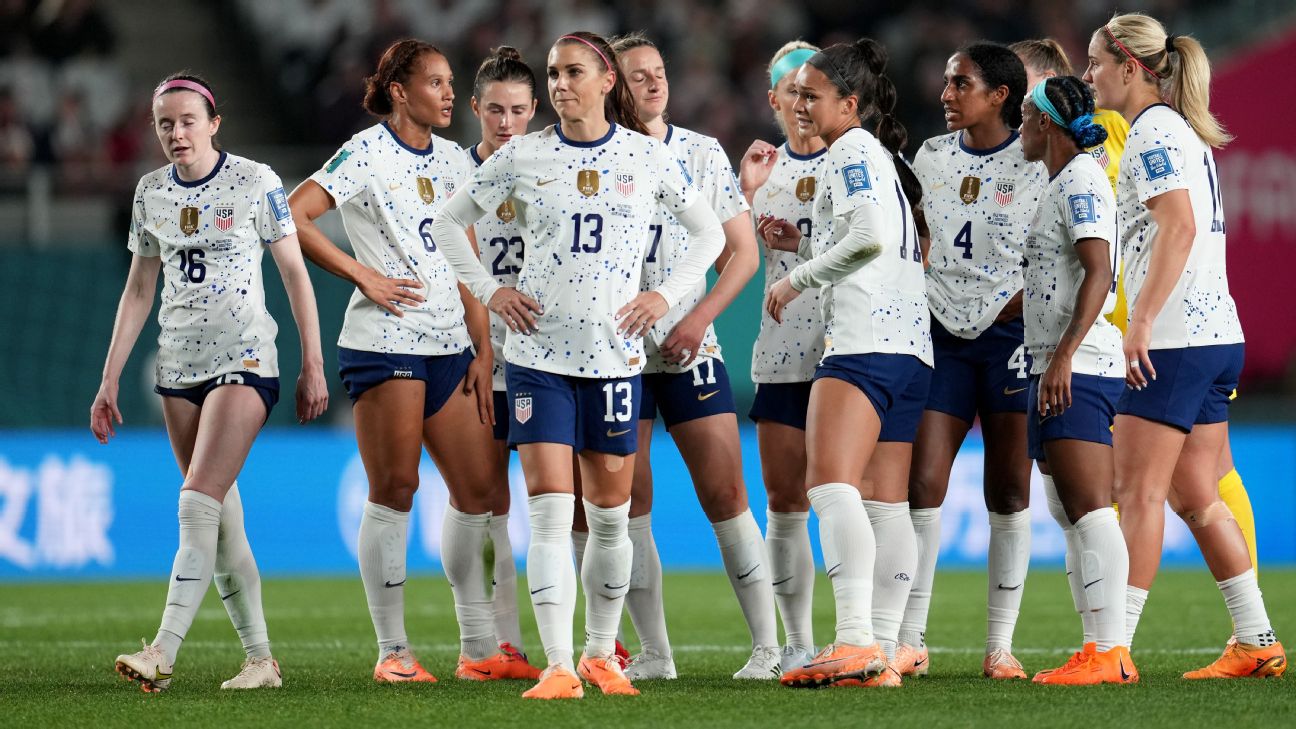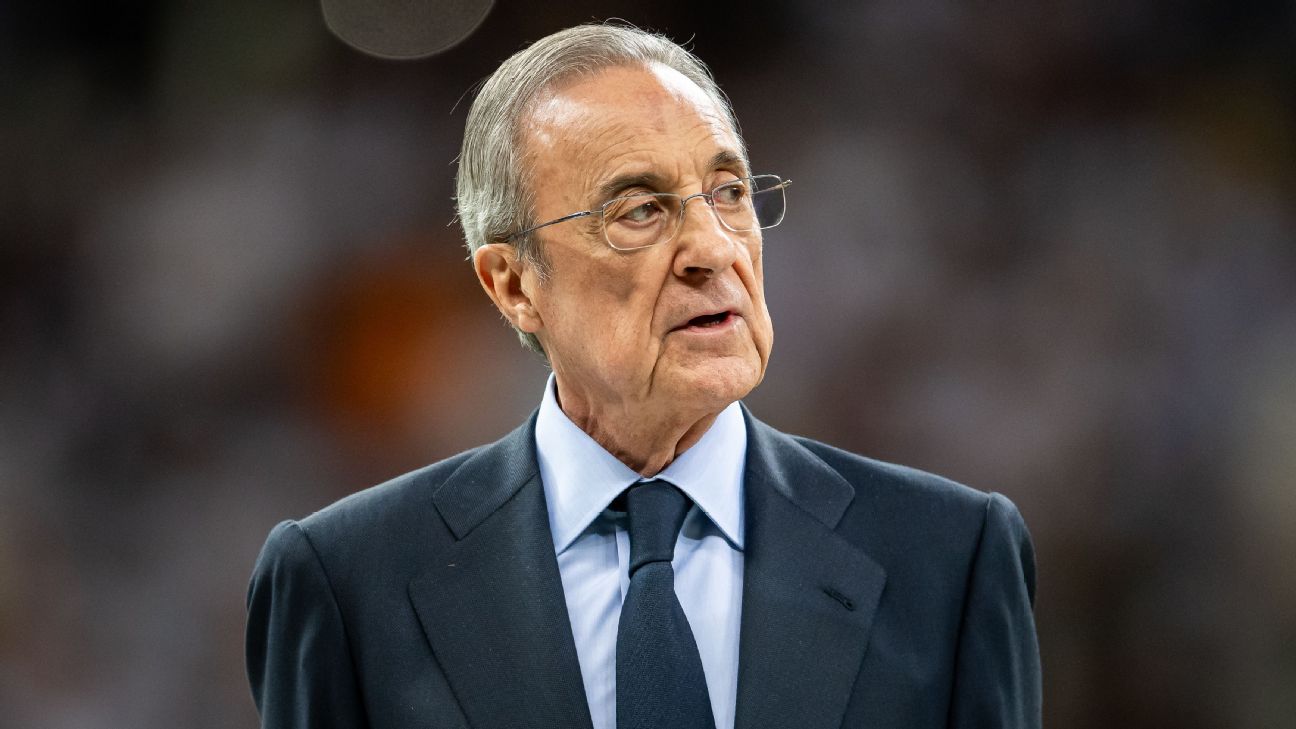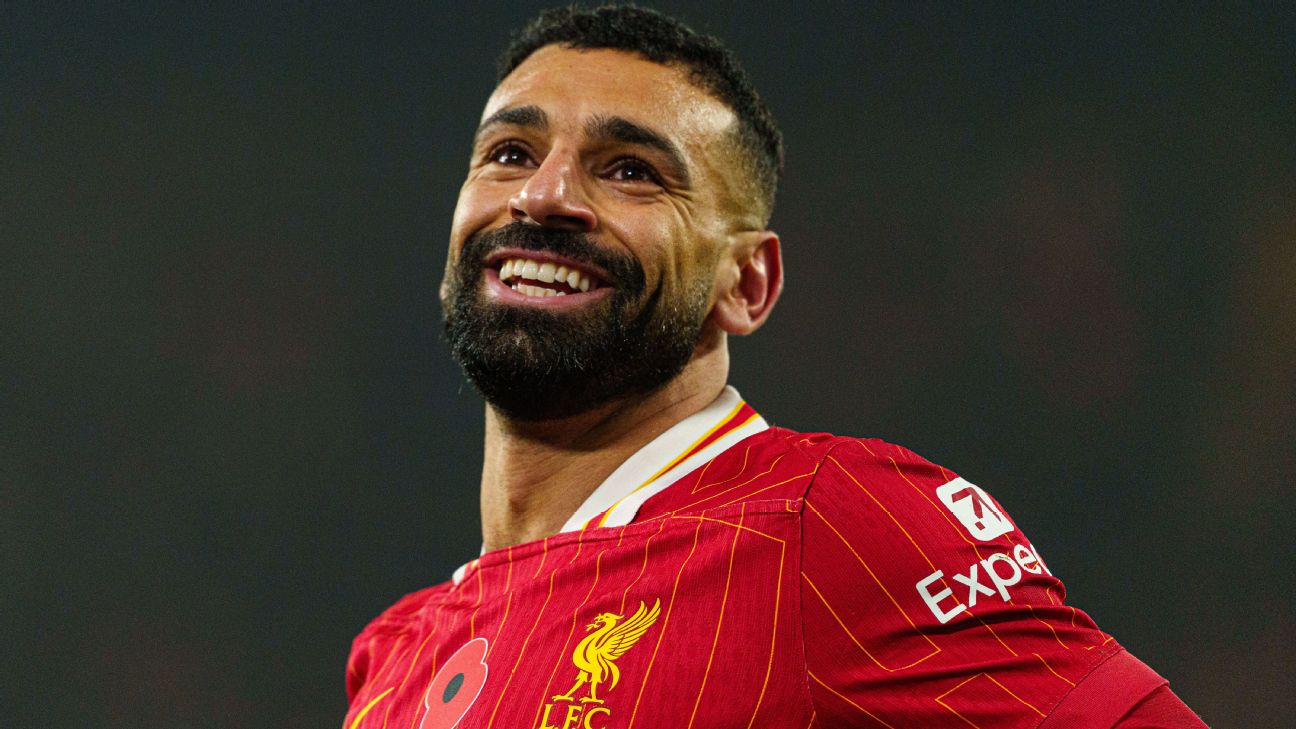AUCKLAND, New Zealand — If it has looked to you as if the players on the United States women’s national team aren’t having as much fun as they could be during this Women’s World Cup, they’d be the first to agree.
Asked what’s been missing from this World Cup campaign so far, captain Lindsey Horan on Thursday highlighted a lack of joy on the field.
“It’s that confidence, that belief in ourselves to do what we are most special at — each of us individually, but also as a team — and also finding the joy in it,” Horan said, then promised: “Once we get a little bit more of that joy back and that feeling, things are going to move a bit better.”
– Women’s World Cup: Landing page | Schedule | Rosters | News
– Stream on ESPN+: LaLiga, Bundesliga, more (U.S.)
But a lack of the swagger and fun that has defined the USWNT over the years — including its rollicking campaign to win the previous World Cup in 2019 — is hardly the only problem you could identify within this U.S. team.
The USWNT is struggling with the fundamentals: Players aren’t stringing together passes, putting shots on target or maintaining possession. That has played out with the USWNT’s worst World Cup group stage ever: the American women won just a single game for the first time since the Women’s World Cup began in 1991.
This No. 1-ranked USWNT side hardly resembles the reigning Women’s World Cup champions, and although some pundits and former players have raised questions about the players’ mentality, others have called out a failure of tactics and structure, which are the purview of coach Vlatko Andonovski.
It’s a chicken-or-egg question: Is the USWNT not executing tactics well because the players lack the right mentality? Or are the players not showing the right mentality because the tactics are holding them back?
After a listless 0-0 draw with No. 21-ranked Portugal to close out the group stage, and facing a win-or-go-home game Sunday against Sweden in the round of 16, it becomes all the more imperative to figure out the answer.
‘How can we expect growth in seven days?’
Midfielders Tobin Heath and Christen Press, who played for the USWNT under Andonovski at the Olympics in 2021 but are not on the 2023 World Cup squad, placed their criticism squarely on their former coach, albeit without saying his name.
“In every soccer match, you need to make tactical adjustments to exploit spaces, get numerical advantages, yada yada,” Press said on “The RE-CAP Show,” the podcast she hosts with Heath. “And we haven’t seen, in a game, any of those tactical adjustments.
“But it points to the larger point: Have we seen any tactical adjustments in the last year? Have we seen any different formations tried? Have we seen any adjustments to the way that we’re pressing?”
Press added: “We’ve seen the team come out for the last year in the same general shape, in the same general pressing structure. The question I have is: now we’re in this tournament and we’re saying, ‘OK, we’re not super happy with the first three games, but we’re going to grow’ — but if we haven’t seen growth in the last year, how can we expect growth in seven days?”
That’s the problem: If the USWNT’s tactics are all wrong and they’ve been going down the wrong path ever since they qualified for the World Cup last year, it will be difficult to try to change course now. That’s especially true if Andonovski hasn’t shown the ability to adjust and fix vulnerabilities in the USWNT’s tactics over that time — he won’t suddenly become a better coach anytime soon, either.
In that sense, perhaps the focus must shift to player mentality because that’s reasonably the only thing that can change before a must-win game against Sweden. Certainly, that’s where Carli Lloyd, another player from that 2021 Olympics team, has stirred the pot, accusing her former teammates of not caring enough about winning.
Whatever the reason, the individual performances from USWNT players at this World Cup have been below par. In the span of a few minutes against Portugal, for instance, three U.S. players passed the ball out of bounds without any pressure, and it’s jarring to see some of the best players in the world looking this disjointed.
In some ways, it’s reminiscent of how the USWNT looked in Tokyo two years ago. Winger Megan Rapinoe’s assessment after the USWNT’s Olympic opener, a 3-0 loss to Sweden, was blunt: “There’s a lot of stuff we can clean up — trap the ball, pass the ball to your own team is probably the first one.” After the USWNT got knocked out by Canada in the semifinal, Rapinoe’s reaction was similar: “We don’t have juice because the ball’s banging off our shins and we’re not finding open passes and doing the simple things.”
Rapinoe could have been talking about this World Cup. As former USWNT player Julie Foudy said on her podcast, “Laughter Permitted,” the USWNT looked all out of sorts against Portugal: “They can’t even connect four or five passes. They were connecting nothing.” Fellow USWNT legend Kristine Lilly agreed: “They couldn’t keep the ball.”
How could a team that played such ruthless, clinical and spellbinding soccer at the 2019 Women’s World Cup turn into the same team that has struggled with the basics at the 2021 Olympics or this ongoing 2023 World Cup? Perhaps the answer is in the chicken-or-egg question of tactics vs. mentality.
“If you want to look at the feeling the players have, the errant passes on the field — I felt the exact same way at the Olympics,” Heath said. “[Fox pundit, and former USMNT defender] Alexi Lalas made a comment that was really harsh about Crystal Dunn looking like she never played soccer. This is one of the best players in the world. To even think there could be a comment about a player like that, for me, it’s: ‘What is happening?’
“That’s the feeling I had in the Olympics. You [Press] were one of the best players going into the Olympics. Sam Mewis was one of the best players in the world going into the Olympics. How do you take a player that is going into a world championship with the tag of a Ballon d’Or winner [Rapinoe] that’s going to use that platform to win something — how do they become nothing? That’s what I’m seeing.”
‘There are going to be times we need to problem-solve on the field’
Per ESPN Stats & Information, the USWNT has struggled to string together passes at this World Cup. In 2015, the team averaged 4.57 sequences of 10-plus passes per 90 minutes. In 2019, its average was 9.14. At this World Cup? It’s 2.00 so far.
Meanwhile, the number of 1-on-1s — when players take on defenders alone, with the ball at their feet — has skyrocketed. In 2015, the USWNT attempted 15.6 1-on-1s per 90 minutes. In 2019, it was 20.1. At this World Cup? It’s 31.7 through three games.
Former USWNT World Cup winner Ali Krieger explains the areas the side needs to address before its knockout clash with Sweden.
It shows that the USWNT has resorted to a very direct style of play, sending more balls forward and pumping in more crosses per 90 minutes than in the previous two World Cups, too. That has led to more chances and more shots than the two prior tournaments, but the rate of shots on target has plummeted, going from 44% in the two recent World Cups to just 27% so far here in New Zealand.
The players need to play better, and the coaching staff is there to help them do that.
ESPN asked forward Lynn Williams and Horan on Thursday whether they are getting the necessary feedback from their coaches to solve problems on the field.
“I think we are,” Williams said as she sat next to Horan, who didn’t chime in. “We have this high standard and we want to do X, Y and Z, but these teams are good. They’re good, technical teams. So, there are going to be times we need to problem-solve on the field and take that responsibility on ourselves.
“But I think that, even though there are times we didn’t get it right, we were able to rectify that and fix it on the field ourselves. So yeah, I do think we’re getting the necessary feedback and ways to fix it moving forward.”
It’s easy to understand why Williams might have a different take from those of the likes of Heath and Press. The latter two might not necessarily have an ax to grind, but Andonovski is the one who cut both of them from his team — even before Press tore her ACL last year, Andonovski said publicly that he hadn’t been planning to call her into USWNT camp anyway. Williams, meanwhile, is in camp with Andonovski right now. But Lloyd, who has ripped into her former teammates and decried what she sees as a lack of passion within the team, has also been willing to criticize her former coach, notably over his reluctance to use his bench to bring on game-changing substitutes. Ultimately, it might be impossible to pinpoint what’s going wrong — the Olympics happened two years ago, and clearly all the lessons weren’t learned from that tournament — but before a tough knockout match against Sweden, the USWNT must get better. Whether the players improve their mentality or the coach improves his tactics — or both — something’s got to give, or the USWNT might find itself making history with its earliest exit ever in a major tournament.



